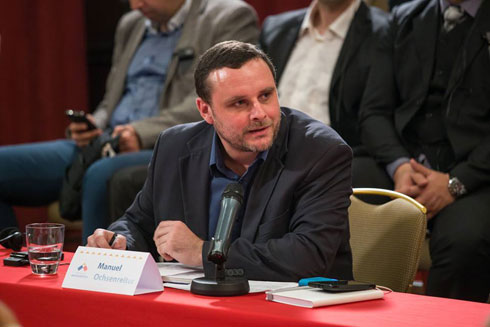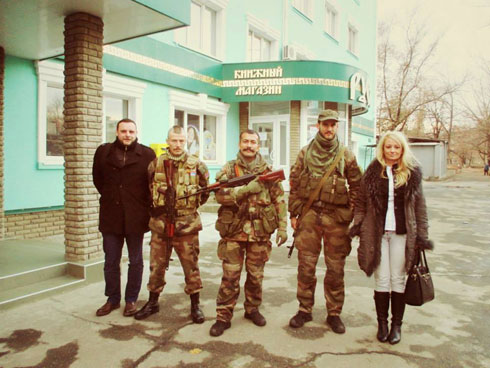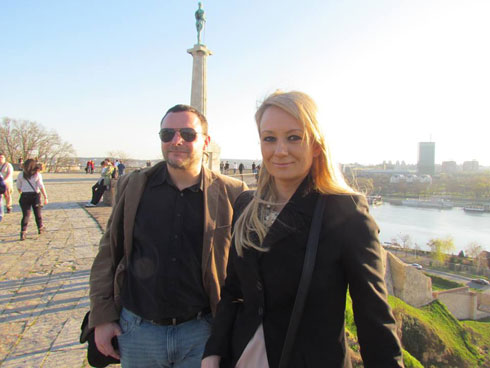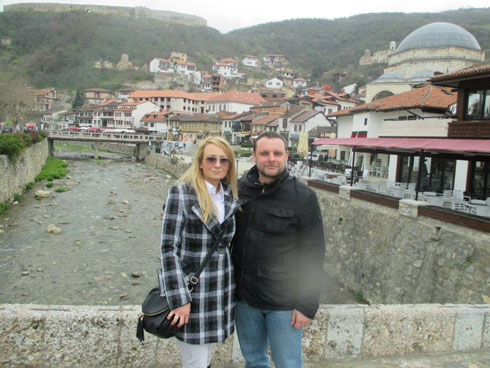Manuel Ochsenreiter: Тoday´s Тhreat to Europe is the US Occupation
 Interviewer: Dragana Trifkovic
Interviewer: Dragana Trifkovic
* Manuel Ochsenreiter is an award winning German journalist who regularly appears on RT covering subjects ranging from US military and economic hegemony in the world, to socio-political matters within Europe. Ochsenreiter was from 2004-2011 chief editor of Deutschen Militärzeitschrift, for which he continues to write. In March 2011, he moved to the same position for monthly Zuerst!
* Dragana Trifkovic is the Director General of the Center for Geostrategic Studies, and is an Engineer, Author (FSJ, Geopolitika, Novi Standard, NSPM, Zuerst), as well as a Member of the DSS political council. She writes regular columns and articles for Serbian political, ideological, geostrategic and geopolitical publications, and has appeared numerous times on Serbian television.
![]() met Manuel Ochsenreiter in Belgrade, at the conference organized for the 15th anniversary of the NATO aggression against Serbia, and since then our cooperation has been outstanding. He is an excellent geopolitics connoisseur and an exceptional military analyst. Mr Ochsenreiter has been the editor in chief during seven years for the German military magazine (Deutsche Militärzeitschrift), and after that he founded the monthly magazine ZUERST! which main subjects are geopolitics, politics, military questions, economy and culture. The magazine ZUERST! is different from other magazines because its articles are well-argued. That is why it is one of the rare German periodicals where you can read the truth about Kosovo and Metohija, about Srebrenica, the special war against Serbia, etc. Manuel Ochsenreiter went several times to Syria during the war, where he visited the war zones with the Syrian army. He also published his reports about Syria in the Serbian magazine Geopolitika. For some time now, ZUERST! has been also publishing my texts, interviews and analysis. In their last edition, they published the interview with Marko Jaksic about the situation in Kosovo and Metohija, as well as my interview with the French-Serbian unit commander in Novorossiya.
met Manuel Ochsenreiter in Belgrade, at the conference organized for the 15th anniversary of the NATO aggression against Serbia, and since then our cooperation has been outstanding. He is an excellent geopolitics connoisseur and an exceptional military analyst. Mr Ochsenreiter has been the editor in chief during seven years for the German military magazine (Deutsche Militärzeitschrift), and after that he founded the monthly magazine ZUERST! which main subjects are geopolitics, politics, military questions, economy and culture. The magazine ZUERST! is different from other magazines because its articles are well-argued. That is why it is one of the rare German periodicals where you can read the truth about Kosovo and Metohija, about Srebrenica, the special war against Serbia, etc. Manuel Ochsenreiter went several times to Syria during the war, where he visited the war zones with the Syrian army. He also published his reports about Syria in the Serbian magazine Geopolitika. For some time now, ZUERST! has been also publishing my texts, interviews and analysis. In their last edition, they published the interview with Marko Jaksic about the situation in Kosovo and Metohija, as well as my interview with the French-Serbian unit commander in Novorossiya.

- Dear Manuel, when you visited Serbia the first time, what was the reason and what impressions did you get?
A: I think it was some when in the very early 2000s. The reason was a reportage about the Military Museum in the Belgrade Fortress for the “Deutsche Militärzeitschrift” (DMZ), the military magazine I was doing by that time as editor-in-chief. It was really great, I spent some days in Belgrade and had a very good time. Later on, in 2008, I was there when the protests took place against the proclamation of independence of the NATO occupied Serbian province of Kosovo and Metohija.
- What kind of experience was it to meet the Serbs personally, and what are the similarities and differences concerning the „marketing“ that the Western media reserved for us? Do we look like savages with a knife between the teeth, as they describe us?
A: (laughing) This question sounds a bit like: “The Serb, the unknown entity.” But there is a tragic true core in it. Serbs are stigmatized by European mainstream media and politics since the early 1990s. Without a doubt the Serbs are the underdogs in the mainstream media coverage. The explanation is easy: Serbia is one if the main geopolitical obstacles for the West in Europe. And the historical or recent enemies of the Serbs – Croats, Bosniaks and Albanians – are the lap dogs of Brussels and Washington. The Serbs are always portrayed through that specific geopolitical template. It has nothing to do with the “Serbian nature” or the “Serbian national character”. The Serbs I met were always very honest and compassionate people with a strong sense for their nation. They have a strong sense for politics of history. Even those Serbs who have a strong degree of reluctance against the Federal Republic of Germany – of course because of the German involvement in the NATO aggression against Belgrade in 1999 – were always overly friendly and outspoken polite with me. I can´t complain at all. Among my best friends the Serbs are definitely overrepresented.
- How do you like the Serbian food and the Serbian rakija?
A: I fell seriously in love with both. The Serbian food is the best protection not to become a postmodern “Vegan” hipster!
- I know that your magazine ZUERST often publishes articles about Serbia that objectively and impartially analyze the past events in countries of the former Yugoslavia. What are the readers’ reactions in Germany concerning these texts?
A: Generally our audience appreciates that we deliver the naked facts as they are. Serbia is a nation which suffers from the Western war lies as much as other countries like Syria, Russia or Iran. That has again geopolitical reasons and nothing to do with the reality. Of course many Germans think that the Serbs hate them, on the other side many Serbs think that the Germans hate them. Both groups step into the same tragic geopolitical trap, installed by transatlanticist circles in mainstream media and politics. That geopolitical trap works also with long-standing historical prejudices: The tragic history of the two World Wars which made our people fighting against each other. But today´s threat to Europe is the US-occupation. Germans and Serbs are on the same side of the geopolitical barricade. It is our job as journalists and editors to transport that important fact to our readers in Germany and Serbia.
- Our first common professional trip was to Kosovo and Metohija. We visited there many places and met a lot of people. It was very dynamic and interesting. What left the biggest impression on you?
A: Kosovo and Metohija is one of the most important geopolitical hotspots in Europe. One can see there the slow but effective genocide of the Serb population. There can´t be any doubt that the Albanian population sees the seizure of the whole region as a “military campaign”: They plant Albanian flags – never Kosovo-flags! – on the houses where Serbs used to live in – like a military standard or a boundary post. It was impressive to visit and to talk to the “last Serbs” in the Serbian enclaves in Kosovo and Metohija, ordinary people who resist literally every single day against their own extinction. They live in an absolute hostile environment, their spirit of resistance, stamina and energy is extraordinarilyexceptional. They do that without any support from outside: The West supports the Albanians, Belgrade wants to encourage the Serbs to leave their homeland Kosovo and Metohija to settle in Serbia. The spirit of these people was quite impressive!
- Last month we traveled together to Donbas, where we were international election observers in the People’s Republic of Lugansk. Kiev awarded us with the title „persona non grata“. What are your conclusions about the conflict in Ukraine, after you visited the war zone?
A: (laughing) To be „persona non grata“ of an artificial NATO colony is really not the worst thing to happen to people like us. I think we can live with that. Anyway, we don´t have to visit the entity formerly known as “Ukraine” before the events of the so-called “EuroMaidan”. Anyway, we should consider to visit Crimea more often – it is not anymore part of Ukraine though. But the time in Donbass was very impressive. The parallels to other geopolitical war zones like for example Syria are beyond doubt. The Ukrainian army and it´s criminal militias like the so-called “Azov-Battalion” are aiming civilians and civilian targets in Donbass. The so-called “ATO”-operation of Kiev in the Donbass zone is in reality a punishment campaign against the population in the area. I saw destroyed schools and bombarded residential buildings. In Ukraine and Syria we can see the same geopolitical frontlines: Kiev and the terrorists in Syria are supported by the West, they are a magnet for criminals from all over the world who go there as “volunteers”. In Syria they call themselves “jihadis”, in Ukraine “nationalists”. But those terms simply camouflage the reality: Both are mercenaries of Washington, whether they want or not. It is a fact. On the Kiev side as well as in the rows of the terrorist groups in Syria there are Chechen Islamists fighting. The Syrian army and the self-defense forces of Donbass resist against this threat.
- Thanks to the Western media, most Serbs still see the EU as a good perspective. I do not watch television, but I travel a lot, and I have a completely different opinion. My impressions are that the EU is a failed project and that it is only a matter of time when it will be finally over. You are an EU citizen. What is your opinion about the future of the European Union?
A: The European Union is the most “un-European” entity installed on our continent. This entity doesn´t serve the European people but the interest of multinational corporations. Of course Brussels conducts marketing campaigns in Serbia. The content of those campaigns aims the material wishes of the people: “Look here! You will be EU-citizen! You will earn more money! You will have one day the almighty EURO! You will travel visa-free! You will feel great!” It is a little bit like the old fashioned campaigns of Marlboro which promised a “freedom”-feeling for smoking a cigarette. The realities are very different from those shiny colorful campaigns. Serbs should ask the people for example in Hungary or Slovakia how they were betrayed by Brussels and their own political elite. The big “cosmopolitan promise” of the EU (“You can live and work anywhere in Europe!”) ends up for some young Eastern Europeans as low paid waitresses in filthy London pubs or worse.
I seriously doubt in a quick collapse of the EU. The structure of power can react flexiblyduring crisis. It will take a while to disintegrate the Brussel super state. But more and more people in Europe are waking up and voting for EU-skeptic political parties. This development is encouraging.
- Most Serbs see Germany as an independent and powerful state, with a strong economy and with the position of the most privileged country in the EU. Tell us something about the political and economic situation in Germany. Is Germany really a sovereign and a free country?
A: Germany is an economical giant but a political midget. That is a dangerous combination, because it makes the economy a powerful tool in the hand of others. Germany is the economic and financial backbone of the EU, without Germany Brussels couldn´t act. Foreigners share often the impression of a “powerful country”. They see our chancellor Angela Merkel traveling around and telling others what to do and not to do. In Greece the people even see in Germany a sort of hate worthy neo-imperialist entity which wants to dominate whole Europe. The British yellow press shows us nonstop with Wehrmacht helmet and the good old Pickelhaube when our government says something or our football Mannschaft wipes out the English team again and again.
But the reality is much more complex: Germany is fully under control of the transatlanticist lobby. All established political parties see themselves as a part of the “Western community of values” (“Westliche Wertegemeinschaft”) – of course, without a clear definition what those “Western values” mean exactly. Berlin is not acting on behalf of German interests, but on behalf of that “Western community of values”. German politics is a mentally occupied zone, almost no politician of one of the mainstream parties can even imagine how it would be without being NATO member for example. They even don´t identify the massive US-American military presence in Germany as an “occupation”, they see them as “partners” and “friends”.
That occupation situation became very obvious when the debates about anti-Russian sanctions started in Germany: Everybody knows that those sanctions would hit the German industry. But for Berlin the interests of Washington seem to be more important than the interests of the national economy. That example shows: We don´t act on our own behalf.

- How many US military bases are therein Germany and how many US soldiers? What is their mission there?
A: Germany is today the most important “carrier” of the US. There are around 50.000 US soldiers are in Germany, there are 21 US military bases in according to different databases. But we shouldn´t forget the “secret” installations as well. Officially they are here as “our partners” and “NATO-allies”. We shouldn´t underestimate the fact that US-forces are in many other European countries as well. The United States has active duty military troops stationed in nearly 150 countries worldwide, according to the US ministry of defense (2011). Naive politicians and easy minded people might see there a “peace power”, realistic analysts an aggressive “empire” which enforces its interests with military power. The “de-americanization” which involves the complete disappearance of US military presence is an absolute necessity for the liberation of Europe. And by the way: Many US-Americans think the same way.
- You recently said that the German Intelligence Service (BND) is a branch of the US intelligence agency (CIA). On what is based such a claim?
A: It was an ironic remark with a serious background. We could go back in history and see that the BND is more or less the “baby” of US Intel agencies. But we can concentrate on recent events: The Bundesnachrichtendiesnt (BND) seems always to deliver so-called “evidence” when the CIA is in desperate need for it. Three examples:
- Rafid Ahmed Alwan al-Janabi (Codename “Curveball”) was the Iraqi “witness” who came as an Asylum seeker in 1999 to Germany and gave to the BND many hours of testimony about Iraq´s alleged WMD program and in particular its alleged mobile weapons laboratories. “Curveball´s” reports where the source for the justification of the US aggression against Iraq in 2003. In 2011, al-Janabi admitted for the first time that he lied about his story regarding Iraq´s secret biological weapons program.“Curveball” became the “The man who lied the World into War”. He lives until today in Germany – as a German citizen (he received a German passport with the support of the BND!) under the protection of the German authorities. He even received monthly payments by the BND until 2008. One can say: “Curveball” did an excellent job for the US with the help of the BND.
- In 2013 Washington, Paris and London blamed the Syrian government for a chemical attack in Ghouta on August 21st. The problem: No evidence against the Syrian forces. The BND “helped” again: The BND claimed that its agents listened in on a conversation between a high-ranking member of the Lebanese Hezbollahand the Iranian embassy. The Hezbollah functionary allegedly admitted that poison gas was used by the Syrians. Of course that “evidence” never was published.
- In September 2014 the BND blamed “pro-Russian separatists” for shooting down the Malaysian civilian airplane MH-17 in Eastern Ukraine. But again: That so-called “evidence” of the BND was never presented to the public. It simply was mentioned to influence public opinion on the one side and on the other side the Dutch investigators of the plane crash. Until today we can say: There is no evidence to blame the Donbass self-defense.
One could ask: Why does the American intel need specifically Germany for those fake actions? That might have to do with the excellent reputation of “made in Germany” quality worldwide until today. Generally people trust us more than Americans. But when it comes to Intel work it is a “label fraud”. And again: It harms the German reputation, it is not at all in our national interest.

- How does the German economy respond to the sanctions against Russia? What will happen if Russia bans the import of German cars to their market? Are German businessmen unhappy with the policy conducted by the German government?
A: The German political elite seems to support those sanctions against Russia. The facts are: Germany has close economic ties to Russia. Over 6,000 German firms are active there. Germany receives roughly a third of its oil and gas from Russia. Russia is Germany´s 11th biggest commercial partner, with trade reaching 76.5 billion euros last year, according to the trade association “Ost Ausschuss”. Many companies are worried about losing out on business if further sanctions take effect. Some 350,000 German jobs are linked to business there. We can say: Anti-Russian sanctions are in reality anti-German sanctions.
- Since I travel often to Russia, I had the opportunity to realize that the Russian people appreciate the German people, regardless the previous conflicts, history and politics. Will in the future Germany conclude an alliance with Russia or is there a risk that it will once again declare war?
A: If a German government one day starts to act on the behalf of German national interests it would be good for both Germans and Russians. Both countries are geopolitically natural partners. But before we all can benefit from those great opportunities we have to liberate ourselves from the influence of Washington. We have to become a sovereign nation in a sovereign European alliance which is something else than the recent EU. The precondition for such a change is the de-americanization of our continent.
I seriously hope that our political class won´t be stupid enough to execute any military experiments against Russia. But I am convinced: The German population wouldn´t support today or in future any aggression towards Moscow. Thank god.
**
Originally published in English at Stanje Stvari


Adding an RSS feed (easy, with twentyten wordpress) EASY.
Can you link us a quick demo? Thanks – admin
`Тoday´s Тhreat to Europe is the US Occupation’ .. yes, if I remember from PNAC journal, Europe was to be the USA bridgehead to Eurasia. Would do a lot for Germany. You are the strongest and the most threatened by USA right now. Need a leader who will talk back. With Obama, wouldn’t take much, think.
What do you think of the scenario of the US dollar losing its world reserve currency status as countries around the world drop it, the value of the US dollar falling, and the US no longer being able to afford its military occupation of the world? Is it plausible or likely? What would be some other scenarios for ending the US military occupation of Europe?
Our own J Flores spoke to that question just the day before yesterday.
http://fortruss.blogspot.com/2014/12/russia-china-start-trading-in-local.html
Reblogged this on Where do We go from Here? and commented:
“I seriously hope that our political class won´t be stupid enough to execute any military experiments against Russia. But I am convinced: The German population wouldn´t support today or in the future any aggression towards Moscow. Thank God.”